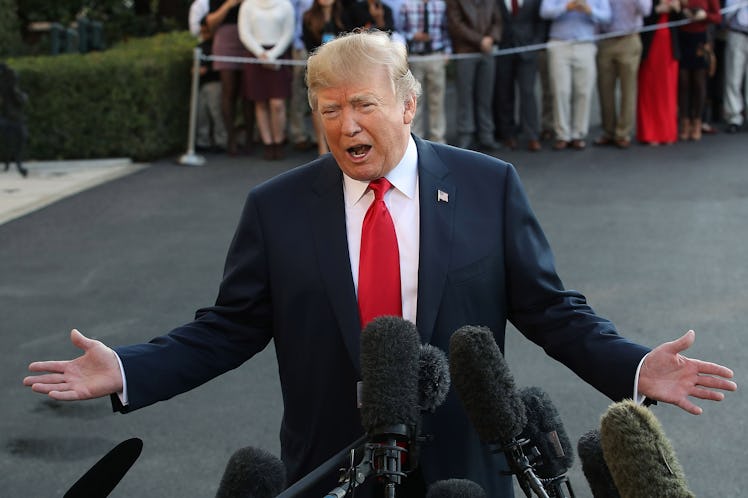
People Are Calling Trump Hypocritical For Mental Health Comment On Texas Church Shooting
A mass shooting at a church in Sutherland Springs, Texas on Sunday, Nov. 5, left at least 26 people dead and dozens more wounded. During a press conference in Tokyo, Japan on Monday, President Donald Trump called the Texas shooting a "mental health issue," leaving guns largely out of the debate. His response to the Texas church shooting has quickly come under fire.
The president sent his condolences during the press conferences, saying,
I want to take a moment to continue sending our thoughts, prayers, and deepest condolences to the victims of the horrific assault on a church in a beautiful area. So sad. ... Who would ever think a thing like this could happen?
Later during the press conference, when Japanese Prime Minister Shinzo Abe and Trump were fielding questions, Trump was asked by Steve Holland of Reuters what policies he would support to prevent future shootings, and whether gun control is the answer. Trump responded,
Mental health is your problem here. This was a very deranged individual ... We have a lot of mental health problems in our country ... This isn't a guns situation — I mean we could go into it, it's a little bit soon to go into it ... but this is a mental health problem at the highest level. It's a very, very sad event.
It's unclear how the president knew the mental health status of the shooter, who died in a crash after a car chase with police. Per The Hill, officials have not released any assessment yet of the shooter.
Regardless, Trump's comments at the press conference set off a fresh round of criticism.
Trump's "mental health" scapegoat is at odds with his policies.
Trump said Monday that mental illness was the issue. Fine, but let's not forget that, back in February, Trump signed into law a rule that loosened the requirements around mental health background checks for gun purchases. According to FactCheck.org, requirements to report individuals prohibited from buying guns was initially the product of a law signed by President George W. Bush in 2008. Following the Sandy Hook shooting in 2012, President Barack Obama issued a memorandum ensuring that federal agencies were following this law. These rules required that firearms dealers run background checks on prospective buyers, and allowed for a 72-hour hold for reviewing applicants.
Just before leaving office, Obama finalized the Social Security Administration's rules, which required reporting to include people who receive Social Security benefits for a documented mental health condition and are regarded as legally incompetent or unable to handle their own affairs. An estimated 4.5 million records existed as of December 2016 for those individuals. This rule was stripped away in February when Trump signed H.J. Res. 40.
People haven't forgotten, apparently. And they're calling out the president on what they perceive to be hypocrisy.
People on social media are also calling for policies that implement change, rather than hollow platitudes and apologies after a mass shooting that does little to curb future violence.
Meanwhile, people are also remembering this week that Trump has joked about shooting people in the past.
Trump's comments Monday in Tokyo drew a sharp contrast in tone with the way he joked in January 2016 about having such loyal followers that he could "stand in the middle of Fifth Avenue and shoot somebody" and wouldn't lose voters.
Trump's response to the Sutherland Springs shooting is nothing like his responses to the New York City attack.
It seems strange that Trump would say it's "a little bit soon" to bring up the conversation around gun control when he has been quick to fire off sweeping declarations about how to combat "terrorism" following similar incidents. After a terror incident in New York on Halloween in which a driver mowed down several people in a truck, killing 11, Trump called for both policies and personal punishment:
After the London tube attack in September, Trump jumped to use the incident to promote increased security. So what makes one incident an opportunistic zero-hour launchpad for policy and another a prognosis-less shrug?
The answer is too long for one article. But you can start by looking at how he frames these incidents.
Trump's labeling of these events is — you guessed it — another point of hypocrisy.
Trump has repeatedly come under fire for his double standard in how he labels violent incidents and those that commit them. His statements following the New York attack, for example, were wildly different in comparison with those made following a mass shooting at a country music festival in Las Vegas that killed 58 in early October. There is a protocol to follow as far as officially labeling an incident as terrorism or not, but regardless, his statements were also picked apart for their hypocritical leanings.
Often, Trump has labeled as terrorism indicidents commited by non-white males. The common thread isn't difficult to ascertain.
Following the violence this past week, we're not just sending thoughts and prayers to New York and Sutherland Springs, but to every New York and Sutherland Springs that has been affected by mass shootings and terror incidents. And we're praying that the conversation at the highest level of office can transcend (a very conditional) sympathy and translate into action.